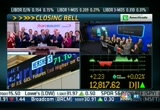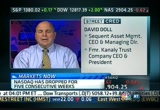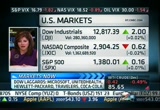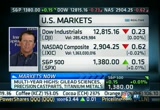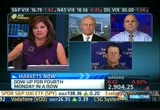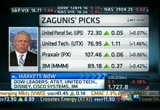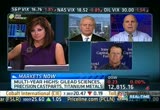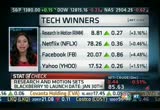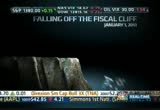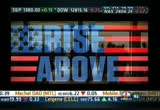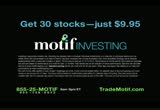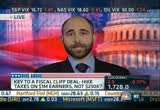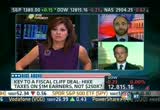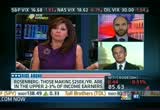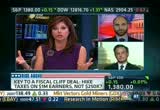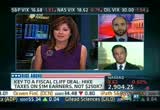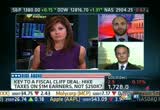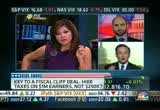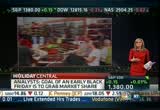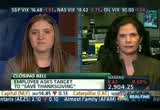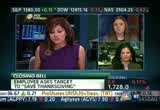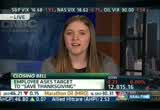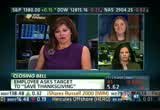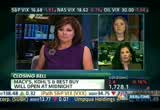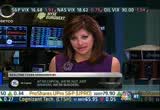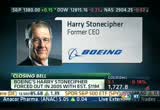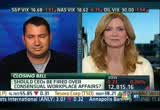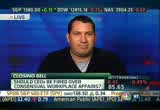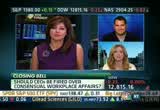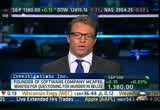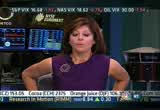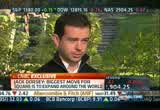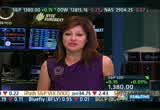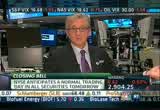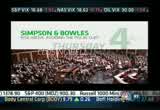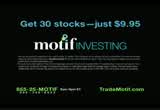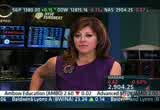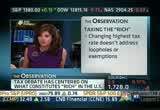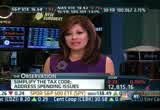tv Closing Bell With Maria Bartiromo CNBC November 12, 2012 4:00pm-5:00pm EST
4:00 pm
bell." maria has second hour. i'll see you tomorrow. ] it is 4:00 on wall street. do you know where your money is? welcome back to the "closing bell." i'm maria bartiromo on the floor of the new york stock exchange. take a look at how we're settling out. mixed performances for other averages. dow tonight up two points. of course, today, we honor veterans with bond market closed among others. banks as well closed. nasdaq down a fraction. it too all over the map today with the s&p 500 up just a fraction. the range on the dow, had-t had been down 34 and up 45, ending right about where we began the session. a quieter start to the week on wall street as markets debate how washington will avoid that fiscal cliff and going over it.
4:01 pm
will the markets wait for a deal or are investors already taking action into their own hands? let's get to our panel, david dahl, mark travis, and robert zagunis will join us in a moment. good to have you on the program. david, let me begin with you. how are you invested right now amidst all of these issues pertaining to the fiscal cliff, higher tax rates in 2013, et cetera? >> always good to be back with you. we've been defensive. we've looked for opportunities to take gains over the course of the year. thankfully we've been very u.s.-centric in our investments over the course of 2011-2012. what we're preparing for now is looking again at the foreign markets in 2013. >> foreign markets meaning you want to be allocating money outside of the u.s. because of these issues in the u.s.? >> well, taking a look at some of the large global players here in the u.s. and outside, because as tax rates go up here in the united states, what we're about
4:02 pm
to see is probably the laugher curve in reverse. tax rates going up, revenues declining, creating a headwind for gdp. we're look at companies in the world for looking for global growth opportunity outside our borders. >> mark, let me get your standpoint on this. all year all we've been hearing about are dividend payers. why? because the yield -- there's no yield anywhere with rates where they are. everyone is searching for yield. they've found it in some companies that actually pay dividend, etf that pay dividend. there's a lot of those that have done so well. is this the time to avoid or sell those companies now or not? >> well, i don't think so, maria. i think i mean, i think we'll see higher taxes whether we get those through reduced deductions or obama care surtax. a lot of high quality businesses that pay the $210 billion from
4:03 pm
the treasury. >> so which companies would you still be buying even if taxes go higher? what's your expectation? are we talking about going up to ordinary income, 40%? are we talking about 25%? what's your betting? >> maria, i mean, i think at this point it's kind of baked in that we're going to, you know, 438. i think we're looking for a disconnect between market and value in a market that's overannualized. we found a few that have certainly come off a good bit. there's a disconnect. and that's where we will continue to invest. going forward. >> are you saying -- are you saying you think dividend tax is going to 43%? >> well, i think that's what's in effected going to effectively happen with obama care. i mean, you know, you're going to have a 3.8% surtax.
4:04 pm
i don't know. we'll see. maybe they'll kick the can down the road and we'll become greece. i don't know. >> oh, god. you have -- wow. robert, jump in here, from jensen investment management. i don't know if you heard that question. i've been asking everybody, given the fact dividend payers have been the only place to be because rates are so low and no place in this market to get a yield, unless dividend payers, is now time to unload them or do you want to stick with it and see what happens? >> our focus is different in the sense we continue to focus on companies that have higher return on invested capital. the r.o.e. that sets the stage for companies with strong balance sheets, dividend, share buy backs and then the acquisition. the companies with the higher return for at least one decade, are that they can do all these thing concurrently. we don't think you necessarily have to choose.
4:05 pm
now, certainly the tax impact will have some bearing on it. but we love to see strong paying dividends on companies like utx and u.p.s. also making pretty strong acquisitions for the long term. >> you're looking at growers, companies that have the growth in place, but also that pay dividends? >> right. without compromising the quality. their balance sheet remains strong and they can fund their own growth and make acquisitions that are strategic in times when the economy is in turmoil and specific industry is in turmoil as well. we like that. >> mark travis makes a good point if we don't see anything done in the fiscal cliff, say they do nothing, dividend taxes go t 43.8%, capital gains taxes go much higher. is that a reason to get out of this market? what do you think that does to the market? >> i think the other thing -- we have a long-term hold period. our average holding is seven years. i think part of it will force the long-term investor to become
4:06 pm
long term and not in a trading mentality. if you do have that significant tax hit to concern yourself with, you know, your decisions on the long term types of investments you make will probably change a little bit. and i think that, frankly, is good for the long-term investor. it will have an impact. >> david doll, what's your impact in terms of 2013, where should i be exposed to equities? >> i think 2013 is the exact right question. what we might see here in lame duck, just may be a kicking the can down the road scenario once again. we believe we face massive tax reform coming. the kind of generational tax bill we haven't seen since 1986. with that, you want to be with the nimblest players, the companies that are able to leverage their balance sheet, be able to move around resources, right size effectively. those tend to be the largest global players. >> all right. we'll leave it there. thank you very much. we're watching this developing
4:07 pm
story, if you will. stocks stuck in neutral after last week's big selloff. we're wrapping up today's winners and losers. >> throughout the day the nasdaq had been seesawing between positive and negative territory. composite ending slightly lower on the day. some losers include microsoft as well as some of the chip and semiconductor players, including some hard disk drive players like seagate ending lower by 3.5%. winners include research in motion, rising today after a couple delays. finally set a date for the blackberry launch, the blackberry 10 launch on january 30th. outside of tech, biotech was on fire. strong drug data helped shares of the nasdaq biotech index outperform major indices. last week some names sold off. gilead with positive hepatitis c, that got the street excited. and celgene.
4:08 pm
you can see right,there some biotech players, green across the screen. >> thank you so much. keep it right here. we've got a lot more headed your way on this big edition of the "closing bell." coming up, should the tax threshold for wealthy americans actually be higher than $250,000? and could, say, $1 million be more palatable to republicans looking to make a deal to avoid the looming fiscal cliff? plus, targeting profits. target joins toys "r" us and walmart in opening on thanksgiving night to accommodate black friday shoppers. and some employees are not happy. meet one straight ahead. and sex and the suite. should ceos be fired for having affairs at work or are we going overboard in mixing morality with business? the provocative discussion you
4:09 pm
don't want to miss is still ahead on the "closing bell." [ male announcer ] at scottrade, we believe the more you know, the better you trade. so we have ongoing webinars and interactive learning, plus, in-branch seminars at over 500 locations, where our dedicated support teams help you know more so your money can do more. [ rodger ] at scottrade, seven dollar trades are just the start. our teams have the information you want when you need it. it's another reason more investors are saying... [ all ] i'm with scottrade.
4:12 pm
. if lawmakers don't reach a budget deal to avoid the fiscal cliff, federal taxes will be raised by more than $500 billion in 2013. an average of almost $3,500 per household. welcome back. the question we're all asking ourselves, what constitutes rich in this country? president obama has been very clear, repeatedly saying when it comes to determining who gets a tax increase, it's those individuals that make more than $200,000 and those couples that make more than $250,000 together. but reuters columnist daniel said rich is $1 million. at that level he says we can raise plenty of tax revenue and take a big step to avoid the fiscal cliff. he joins me as well as simon rosenberg who says $250,000 is
4:13 pm
plenty rich. thank you for joining us. daniel, where do you get $1 million? why should $1 million be the threshold in terms of what is considered wealthy? >> it would be great by saying we lived in a world we didn't have to raise taxes on anyone but that's not the world we live in. we have $16 trillion of deficit, deficits four years in a row. something has to be done. taxing the rich, even at $250,000 level or more, isn't going to be enough to fix the deficit situation alone. according to calculation i've done, that will get you somewhere in the ballpark of $380 billion if you let bush tax cuts expire for those people over ten years. now have you to look at what makes political sense because this is all about politics. democrats want to tax people at higher rates if they make more than $250,000. what we need is a compromise. that is $1 million. >> but you just said to me -- you just said to me that you're really not moving the needle, not getting the revenue you need by just taxing the $250,000
4:14 pm
group, so you're getting less revenue by taxing the $1 million group. >> right, a little less. here's the thing. that's where you goat comprom e compromise. here's what's nice about the $1 million threshold up. only lose one-third of revenue. you still collect $250 billion, not enough but you eliminate 200 million from that group and only taxing 250,000 people. these are very rich people. if you're making more than $1 million a year, don't think anyone would argue you're doing pretty well. you can afford it. >> can families with household incomes of $250,000, who live in high cost areas, new york, san francisco, significant amounts of the u.s. population living there, and can they be considered rich? >> i think for the purposes of this discussion, certainly there's serious consideration of raising their taxes. whether they consider themselves rich or we consider them rich, i don't think they are. i'm one of those people.
4:15 pm
we're living in washington and i don't think i'm rich. i think the important part is basic data. median income in the united states is $55,000 for a family of four. if you make $250,000 or more, you're in the top 5% of wage earners in the united states. by any definition that would be considered upper end or maybe even rich, maria. >> but can you say that. but when you've got a couple bringing in collectively $250,000, you've got the nanny and you've got the food and the gasoline, you're still living paycheck to paycheck. i doubt they feel rich. >> i understand that. but the thing is, basic data, the upper 5 % of income earners. if we're going to do with wha daniel said, make a dent in the deficit, three things we have to do. basic math work this is way. cut defense, raise revenues and reform medicare and medicaid. three critical things that have to get done if we're going to see significant deficit reduction deal. >> i'm going to do an observation about this later on
4:16 pm
in the show but let me ask you this, if we're only attacking the top rate, and you can call it a million, $250,000 f we're only attacking the top rate, that's going from 35% where it is right now to close to 40%, which is where it's going to go at the end of the year if they do nothing about the fiscal cliff, who is to say those people who are able to manipulate or, you know, account for the revenue -- account for their earnings as capital gains versus ordinary income, so they're paying a much lower tax rate, 15%, and the president always says, pay your fair share, who's to say they're not going to do the same thing? whether they're accounting for 40% in terms of taxes or 35%, they're still going to account for it as capital gains and not income. what do we do? we didn't do anything. >> well, i think that -- i mean, that's exactly sort of the point, is that you're not going to see a drastic change here if you're taxing millionaires. but from the political calculus,
4:17 pm
we'll have other revenue measures, corporate taxes loopholes close or something. >> it's the loopholes and exemptions. it's the ability to account your ordinary income as if it were capital gains. if they're not going to take away loopholes and exemptions, taking taxes to 100% is not going to do anything because those people will still account for ordinary income as if it was capital gains. that's my point. >> right. i agree. >> well, maria, it's an important point. if you think about what president obama it talked about with the buffet ettebuffett rul seen difference between investment income and earned income every day, average income for workers, it's gotten so -- the gap is so big taxes are unfair. he's talking about closing that. i i think we'll see two steps in this process. easy things done quickly and then a much broader effort to try to tackle the deficit over time. i don't think that's going to happen in the next two or three
4:18 pm
months. over the next six to nine months let's hope something significant is done to tackle the deficit over time but three things have to be on the table. more revenue, medicare, defense, or we'll not make much of a difference. >> we can't leave this conversation without naming the 40%, some people say 49% of the people who pay no income tax. should they pay something? >> well, it's complicated. >> it's complicated. >> they have to do something with sales tax or state taxes. i do think it's great if we have a system where everybody pays a little more or something but we have to balance that with the current economic situation. right now is not the new time to put new taxes into effect when the economy is barely growing. >> should those people pay something, even if it's a small amount, so everybody has a stake in the ground? >> those people are paying federal taxes. >> i'm not saying income taxes. >> i understand that. 70% of people who pay tax in united states pay more in payroll than income tax.
4:19 pm
i think they are paying into the system. they're just not paying through the income tax. we know wealthy people are not paying enough of their xhk because they get the 15% capital gains tax. >> not all wealthy people. >>, no but there's going -- >> that's a broad statement. >> no, no, but people who get their money through investment income are paying a much lower rate. we have to tackle that as well as broadening the base. we're talking about very poor people. people making $25,000, $30,000 a year. raising their tax by a little isn't going to net that much and they are paying federal taxes. it's not unfair to say they're paying federal tax. they're just not paying that tax. >> anybody in that group is skirting the system, putting themselves under the poverty level when maybe they're really not? >> sure. >> i think if we're looking for that place to get revenue, i think we're looking in the wrong -- >> absolutely. i'm saying if we're only looking at the million dollar group, we're not going to move the needle there either. just putting everything on the table. thank you very much. forget black friday, we're going to look at -- we're looking at
4:20 pm
black thursday, thanksgiving. want to get to jackie with a market flash. we're going to come back with that. more stores are open on the holiday with big sales. stay with us on that. i'll talk with a target employee who says he's starting a petition asking the retail giant and its competitors to put profits aside and save thanksgiving for its thousands of employees. later -- >> the biggest move for us next is we're only doing square in the u.s. right now, so it's bringing this around the world. >> 35-year-old billionaire jack dorsey, founded twitter and now bill plans for his mobile payment startup square. don't miss my exclusive interview coming up.
4:23 pm
it was the warning for the first quarter that was the problem here. the revenues were a little light. and the eps coming in three cents short on guidance. that's what's taking the stock lower. >> target and toys "r" us, latest retailers to kick off black friday sales on thanksgiving. courtney reagan with the christmas creep. >> 42 days left until christmas. 11 days for black friday but for some retailers makes black
4:24 pm
friday 10 days away, on thanks. more than 100 gap, banana and old republic location will be open, locating sears. k-mart will open doors at 8 p.m., followed by target at 9 p.m., macy's, kohl's and best buy at midnight. the goal is to grab shoppers early and gain market share in the process. there is a concern retailers could repeat last year's sins. the earlier they buy, less they buy late, causing them to panic, offering deeper discounts later in the season. jp morgan says many are planning to roll out new product as season unfolds to keep consumers shopping. macy's discussed newness and kohl's hinted at it as well. retailers say don't put us on
4:25 pm
your naulty list. we're giving shoppers what they want. last year nearly 25% of black friday shoppers hit the store by midnight. for some americans it's a welcome escape for family. for some shopping late is better than getting up predawn for door busters. >> thanks very much. not everybody is thrilled about stores opening on thanksgiving. in fact, my next guest is a target employee, casey st. clair, scheduled to work on thanksgiving. she started a paelt asking target to, quote, save thanksgiving. thanks for joining us. >> thanks for having me. >> casey, you're scheduled to work wednesday night overnight until 5 a.m. on thanksgiving morning and again thursday evening starting at 8:45 p.m. what will this do to your thanksgiving? >> i'm actually -- i'm working wednesday into thursday till 3 a.m. and then back at 8:45 p.m. on thursday night on thanksgiving, so that pretty
4:26 pm
much book-ends my whole holiday. i'm looking forward to -- i was looking forward to spending time with my family now it looks like i'll be sleeping all day. >> can you ask for the day off? or do you still want them to open? >> target actually considers it a blackout day where time off requests aren't honored. it's a day where generally everyone has to come in and wok their shift. >> wow. it if retailers are making money by opening thanksgiving, will any petition matter? >> the bottom line is black friday is a market share gain. this is a business. when walmart comes out and says, we're opening early at 8:00 this year, everybody follows. target is following at 9:00. toys "r" us is matching them. this is a business. if you open up earlier and no one follows, you gain share. the problem is, what this is really doing, as all retailers chase walmart, is just pulling sales forward.
4:27 pm
>> well, we asked target about it. this is the statement they gave us. target's opening time was carefully evaluated with the expectations of our guests and the needs of our business and team in mind. casey, what's your reaction? and what do you think -- mean, did you speak to them about you going on television asking that they not open or give you the day off? >> i've not spoken to anyone at target. it's something i've done on my own. in the almost six years i've been there, i've seen the opening every year. i think that it's something that needs to hold off until friday. target is dead on friday night. there's no one in there, in the later hours of friday. so, pushing it back to friday morning, i think, you have time during that whole opening day to have the sales you need. there's no need for it to creep back into thursday. >> well, what about the people who are unemployed? i mean, people need jobs, you know, maybe -- you're okay getting the day off and they could hire other people to do thanksgiving since you're
4:28 pm
book-ended and are unable to spend any time with your family. >> yeah, i mean, i've gotten a lot of feedback saying, you're kind of ungrateful, why are you doing this, have you a job. a ton of people don't. i think that's not the way i'm approaching this. the way i'm seeing this is i value my job at target. enjoy working at target. i just think that that one day, retail is not a necessary service that needs to be open. and i don't think it's going to hurt. if all the companies did it on friday, i don't think it's something that can hurt them. one company doing it -- >> go ahead. >> i said one company doing it, then everyone following along. i think if everyone stuck to friday, i think they'll make the sales they need. >> but, casey, we know how important the thanksgiving holiday, at the end -- after dinner and into friday is for these companies. they're trying hard to get black friday to begin as early as possible. stacy, how important is this for business, being open on thanksgiving night? do you really think people will leave their kitchen tables and not watch football because they want to go shopping at target?
4:29 pm
>> well, they do. we've seen that. i mean, we saw it last year. i would also warn that, you know, target said, as you just explained, that this is what the customer wants. but i would also say that a lot of the offers are staggered, so some offers are at 8:00. others won't be until 10:00 or midnight or at 5 a.m. the following day. so, you're really pushing the consumer to come out and possibly even be disappointed that what they really want might not be available yet. but black friday sales are 10% of holiday sales. so, it is important. if you're the first out there, you will gain market share. i think the onus would be to convince walmart next year it's a bad idea to open and others won't have to follow. >> i don't know how casey's going to do that. we appreciate it. see you soon. is the found of twitter on to another huge game-changer? >> i love the leveling of the
4:30 pm
playing field. >> i'll speak to 30-something billionaire twitter founder jack dorsey about his mobile payment startup called square and whether it can go global the way twitter has. somebody says corporate america has gone overboard when it comes to ceos being fired for having heat affairs. shocking allegations. john mcafee, founder of the software company has been accused of murder in belize. stay with us on this story. ♪ [ female announcer ] today, it's not just about who lives in the white house, it's about who lives in the yellow house, the green, and the apartment house, too. today we not only honor the oval office, but we honor the cubicle, and the home office as well. because today it's about all of us. and no matter who you are, you're the commander-in-chief of your own life. ♪
4:31 pm
you're the commander-in-chief of your own life. if we want to improve our schools... ... what should we invest in? maybe new buildings? what about updated equipment? they can help, but recent research shows... ... nothing transforms schools like investing in advanced teacher education. let's build a strong foundation. let's invest in our teachers so they can inspire our students. let's solve this.
4:32 pm
4:33 pm
welcome back. lockheed martin's incoming ceo and chief petraeus just the latest in high profile bosses brought down by a sex scandal. jane wells in los angeles with the story. >> reporter: it's a story older than "mad men" but much higher consequences and much bigger payoff. several instances. brian dunn stepped down after discovered he had an appropriate relationship with a 29-year-old female employee, getting a $6.6 million good-bye package and led to erm departure of richard
4:34 pm
schultz. highmark dismissed kenneth melani for lying repeatedly about a woman he hired. two years ago hp ceo mark hurd was forced out after sexual harassment allegations. by an outside contractor. hurd walked away with an estimated $34 million. boeing ceo harry stonecipher left boeing with an $11 million in boeing stock. what may be the most unusual case, earlier this year stryker fired ceo stephen macmillan even though he had come to board members and gotten permission to date a female employee as long as the employee resigned. he did. he still got fired because some board members suspected the relationship started earlier than he led them to believe. i couldn't find any with female
4:35 pm
krooez. the only scandal is the resignation of patricia dunn from hp for spying on reporters. no sex there. that case was a federal crime as opposed to adultery. back to you. >> so, jane, should consensual affairs in the workplace cost ceos their job? we have both sides of the debate. dan gross of daily beat says this does not belong in the top of any company but clinical psychologist wendy walsh says affairs happen all the time in the office and it shouldn't be an issue. wendy, make your case. >> well, there are a few exceptions to that. if you are violating an employment contract that has morality clause or dealing with something that may be a threat to national security, but otherwise people at the office have sex all the time. and if their peers, not talking about a power dynamic where a boss is probably overusing too much power with an underling, it's perfectly okay. it has nothing to do with
4:36 pm
employment. it has nothing to do with breaking the law. it has to do with human relations and that's for his wife to deal with. >> dan, you say you can't separate it. you say this isn't just a moral issue, also a legal liability. make the case. >> well, i think a lot of these companies, especially publicly held companies, it becomes a legal issue. they have stated policies that say you cannot have these types of relationships. it opens them up to sexual harassment claims, discrimination claims. it's bad for morale as well if they feel somebody is getting ahead because they have a particular type of relationship with a senior executive, that has a damaging impact on morale. i don't see this as a question of morality. things happen in marriages, people have affairs. it is what it is. but people get fired for violation of company policy all the time. and when you go to work somewhere, they make you sign papers saying that you will adhere to the policy on document preservation and on the use of your phone and on the travel policies.
4:37 pm
this is one of another -- you know, one in a long series of policies people adhere to. in the case of lockheed martin, there was an explicit policy against this. >> what about that, wendy walsh? you know, dan's making some really good points. it's not necessarily a moral issue but it's adhering to company policies and putting the company in a place that makes them vulnerable. >> absolutely, i agree, especially when it comes to employment contracts and with the legal problems that may crop up as a result of it. but when we're talking about people on the same level, the workplace is the most common place that people meet each other and date and mate and sometimes eventually marry. so, to say that we shouldn't be human beings and shouldn't ever enter into personal relationships in the workplace would be insane. >> can you really say that you could just turn a blind eye to someone you know in a leadership position at the company who's actually cheating on his wife, cheating on her husband, and not do anything about it?
4:38 pm
>> again, the difference is a leadership position. let's look at david petraeus. it was the women that got him in the end, the one he supposedly was having the affair with, got jealous of another potential relationship that may not have been sexual but she started sending her harassing e-mails. it's a self-regulating issue and women are the erectors of boundaries. >> you don't think petraeus should have resigned? >> oh, i do. he's the director of the cia. you know secrets get past on the pillow. >> we'll leave it there. thank you very much, wendy walsh, dan gross. meanwhile from ceo sex scandals to murder accusations. the founder of antivirus company mcafee reportedly wanted for questioning in the murder case in belize. robert frank now with the shocking story. >> various media stories say mcafee is sought for questioning
4:39 pm
in the murder of an american in belize. mcafee hasn't returned my calls for comments or my e-mails. few entrepreneurs have had as colorful life as john mcafee. off faunding the software in his '80s his net worth soared to more than $100 million. he owned a jet, invested millions in financial markets. as he told cnbc's david faber -- >> i had really more money than a person could reasonably be expected to spend, assuming you fight hard and worked at it eight hours a day. >> now, get this, when the crisis hit mcafee's investments crashed. his $100 million became $4 million. he moved to belize to start new companies in transportation and pharmaceuticals. he told me in 2010 that belize was, quote, a dream country from entrepreneurs since there are really no regulations. police searched his compound and
4:40 pm
found multiple firearms and unlicensed pharmaceuticals. mcafee said the search was political. that may be the case with this latest situation. we'll see where this story takes us next. >> why is he being questioned in the murder of this person in belize? >> we don't know. what we do know is this person who was murdered may have been his neighbor. there was a previous -- some kind of charge or harassment allegation by this neighbor against mcafee. they did seem to have, according to police, a tense relationship leading up to this murder. that's all we know at this point. >> we'll keep following that. thank you so much. robert frank. twitter founder jack dorsey is joining me. find out how he's planning to eliminate cash and credit cards with his new company saying soon all all you'll need to make a purchase is your phone. stick around for inside view of what will move your money tomorrow morning before the opening bell sounds. jooishgsz [ abdul-rashid ] i've been working since i was about 16.
4:41 pm
4:42 pm
♪ well, if itmr. margin?margin. don't be modest, bob. you found a better way to pack a bowling ball. that was ups. and who called ups? you did, bob. i just asked a question. it takes a long time to pack a bowling ball. the last guy pitched more ball packers. but you... you consulted ups. you found a better way. that's logistics. that's margin. find out what else ups knows. i'll do that. you're on a roll. that's funny. i wasn't being funny, bob. i know. try running four.ning a restaurant is hard,
4:43 pm
fortunately we've got ink. it gives us 5x the rewards on our internet, phone charges and cable, plus at office supply stores. rewards we put right back into our business. this is the only thing we've ever wanted to do and ink helps us do it. make your mark with ink from chase. . my next guest, co-founded twitter and he is the ceo of a firm called square. a company breaking through the great divide in mobile and commer commerce. i spoke to jack dorsey this weekend. he told me square is going global and gave a sneak peek at a view on going public.
4:44 pm
>> so, what's the business model then for square, from your standpoint? >> we charge 2.75% per swipe. and then that's actually the lowest in the business, so typically merchants get charged 3% to 5% to accept credit cards. depending on the card used because they have to face the interchange. so, we've taken the interchange away, it's just one fee, 2.5%. there's no cost for the application. there's no set-up fee, no monthly fee. just 2.75%. >> it's such a great idea. and because of that, you've got other companies nipping at your heels. so, you've got folks like intuit and paypal wanting to do what square does. how do you build a moat around square and stay in the lead? >> our focus has always been around not just payments but the entire commerce experience, the entire buying and selling experience. if you look at just payments, then you're looking just at the payer. the payer is actually just
4:45 pm
someone who does a mechanical thing. we wanted to remove all the mechanics of payments. >> so you also co-founded twitter, which also has sort of changed the world in a different way. is there a thread between twitter and square that you can talk to us about in terms of what's similar and what they're both tapping into? >> i think the common thread is simplicity. twitter made it very, very simple to have a conversation with the world. just by updating what's around you and sharing what you're seeing or what you're experiencing. and the entire world can then participate in that and have a conversation with up. and square really simplified getting into commerce, both from a seller perspective and also from a buyer perspective where you can just pay with a device you don't leave home without, which is your phone. both have simplicity. both have very broad utility. where an individual can come to each service and really make it their own. also the largest organizations in the world, like a starbucks
4:46 pm
or like the u.s. government, can use something like twitter to really broadcast their message and make it feel smaller, make it feel more personal. >> where are you looking to take square? it's valued at, what, $3 billion. what would you like to see? >> well, i would like to, you know, the biggest move for us next is we're only doing square in the u.s. right now. so, it's really bringing this around the world. we just expanded out to canada about -- a few weeks ago. we're looking at countries all over the world to bring the same ideas, the same great buying experience everywhere. >> tell me about twitter for a moment. what's the business model? >> the business model is arou around -- it's around introductions, it's around advertising. you'll see it promoted, tweets, promoted trends relative to you. if you follow certain accounts, you'll get tweets that are relevant to those accounts. so, it's a very simple. it allows to you really see something in another dimension
4:47 pm
and introduce you to something you wouldn't otherwise see. >> what's the exit strategy? i mean, how do you know when it is time to go public and open this up? >> well, i think you can -- you can think about an ipo as an exit strategy. you can think about it as a goal. or you can think about it as a milestone. and we think of it more as a milestone. it's something that is another fund-raising event for the company, for both companies. and really right now we're just getting into the discipline so we can make the choice when we feel the company and the market is ready for that milestone. but you don't stop there. you just keep going and going and going and building and building. both companies want to build something that's sustainable, that lasts beyond one generation of a human life. and something that really makes a deep impact in the world. >> when i was reading your story, i was so struck by some of the moves you made. at one point you wanted to be a massage therapist. >> uh-huh. i took 1,000 hours of massage
4:48 pm
therapy in st. louis, missouri. and i wanted to get away from computing a bit. i was developing a little rsi, so i wanted to understand how to fix myself. and i was in missouri, and i completed my course. i was practicing. then i moved back out to san francisco and realized that everyone was a massage therapist and i just didn't want to compete with that so i went back to programming. >> now that you're one of the richest men in the world, i guess that was a good call. >> it worked out. >> it sure did. my thanks to jack dorsey. join us for more of jack dorsey on "the wall street journal report" this weekend. first to bob pisani on a trading glitch that occurred today. >> we just talked to the new york stock exchange. they've been rolling out a new trading platform for a number of weeks. today there was a glitch in one of the matching engines that affected order match-ups here. the important thing is there were 216 stocks that were effected by this. they didn't close. i talked to the nyse. they said they found the problem and the stocks will open as
4:49 pm
usual tomorrow. what i find rather remarkable about this is even though the stocks didn't close, had this been 15 years ago, it would have been a serious problem because the nyse controlled the volume in most of the stocks here. nowadays, these stocks trade on other exchanges as well. so, what happened was, the orders simply went right around them to the other exchanges and while, of course, that was important that it went to the other exchanges, it was a loss of business for the nyse. i'm not sure i saw changes in prices. other exchanges picked up where the nyse wasn't trading. >> that's the way it's supposed to work. thanks, bob. key earnings out tomorrow morning that could move your money. our trio of market pros will be up telling you what they're watching and how they're investing. [ male announcer ] this is steve.
4:50 pm
4:51 pm
4:52 pm
4:53 pm
many? >> we are looking for trading to pick back up after a slow veterans day holiday today. we will see if the market with break nis down. in germany you will see an economic survey. there have been signs of slowing. and then lastly we will look for politicians comments on the fiscal cliff and anything around greece and spain. we will be watching the vix, euro and spanish bond yields. >> what do you want to look at tomorrow to move our money? >> we think one of the biggest keys is the national federation of independent businesses small business index. we know that really about half of americans are employed by small businesses so this is important. as we look at the data we do not think it will be an optimistic report at all. we think one of the best places is favoring the long term treasury bonds. >> we'll leave it there.
4:54 pm
thank you. jennifer, you are up with with 30 seconds on the clock. >> we are also looking at the german survey business. we also get brazil retail sales for september and that will give us a read as to whether retail spending is able to hold up. >> we'll leave it there. thanks very much. we appreciate it. we will be watching those events tomorrow in terms of dictating our market action. we will take a short break and my thoughts on the so-called rich and what it will take to fix our tax code.
4:55 pm
4:56 pm
let's invest in our teachers... ...so they can inspire our students. let's solve this. i always wait until the last minute. can i still ship a gift in time for christmas? yeah, sure you can. great. where's your gift? uh... whew. [ male announcer ] break from the holiday stress. ship fedex express by december 22nd for christmas delivery.
4:57 pm
and finally tonight my observation on the tax code changes that are coming. the debate in washington is largely centered around the highest earners marked by a $250,000 annual income for couples and $200,000 for individuals. why would changing the highest earner's income tax level do anything to put an end to the president's constant call to get high earners to pay their fair share. the top end now is taxed at 35%
4:58 pm
for ordinary income versus capital gains at 15%. the president has complained that too many of the so-called rich are manipulating their ordinary income to look like capital gains. changing the highest rate doesn't do anything to the loopholes and exemptions which allows the individuals to account for the income as capital gains rather than ordinary income. so changing the top rate for an idealology doesn't do the job and move the needle at all. why would an individual manipulate their income to look like capital gains. i'm not suggesting lawmakers should take capital gains taxes to higher rates because that is another negative. that will impact a lot more. anybody selling anything and getting a return whether you are selling your home, stocks, your
4:59 pm
car, you will pay much more as capital gains taxes goes higher. doing nothing and not broadening the base by getting rid of certain loopholes and exemptions does nothing to fix the problem that president obama has with a small portion of business and individuals who are able to count income as capital gains. they will find a way around paying that again. any conversation that simply doesn't flatten the tax code is a waste of time. any conversation that doesn't address our spending issues is also a waste of time and would make any tax overhaul useless. now that there isn't an election to worry about it is time for all of washington to face reality. take a look at the day on wall street. the dow jones had been down about 45 and up about 35 and finished flat on the session as the composite right about where it began
185 Views
IN COLLECTIONS
CNBC Television Archive
Television Archive  Television Archive News Search Service
Television Archive News Search Service 
Uploaded by TV Archive on

 Live Music Archive
Live Music Archive Librivox Free Audio
Librivox Free Audio Metropolitan Museum
Metropolitan Museum Cleveland Museum of Art
Cleveland Museum of Art Internet Arcade
Internet Arcade Console Living Room
Console Living Room Books to Borrow
Books to Borrow Open Library
Open Library TV News
TV News Understanding 9/11
Understanding 9/11